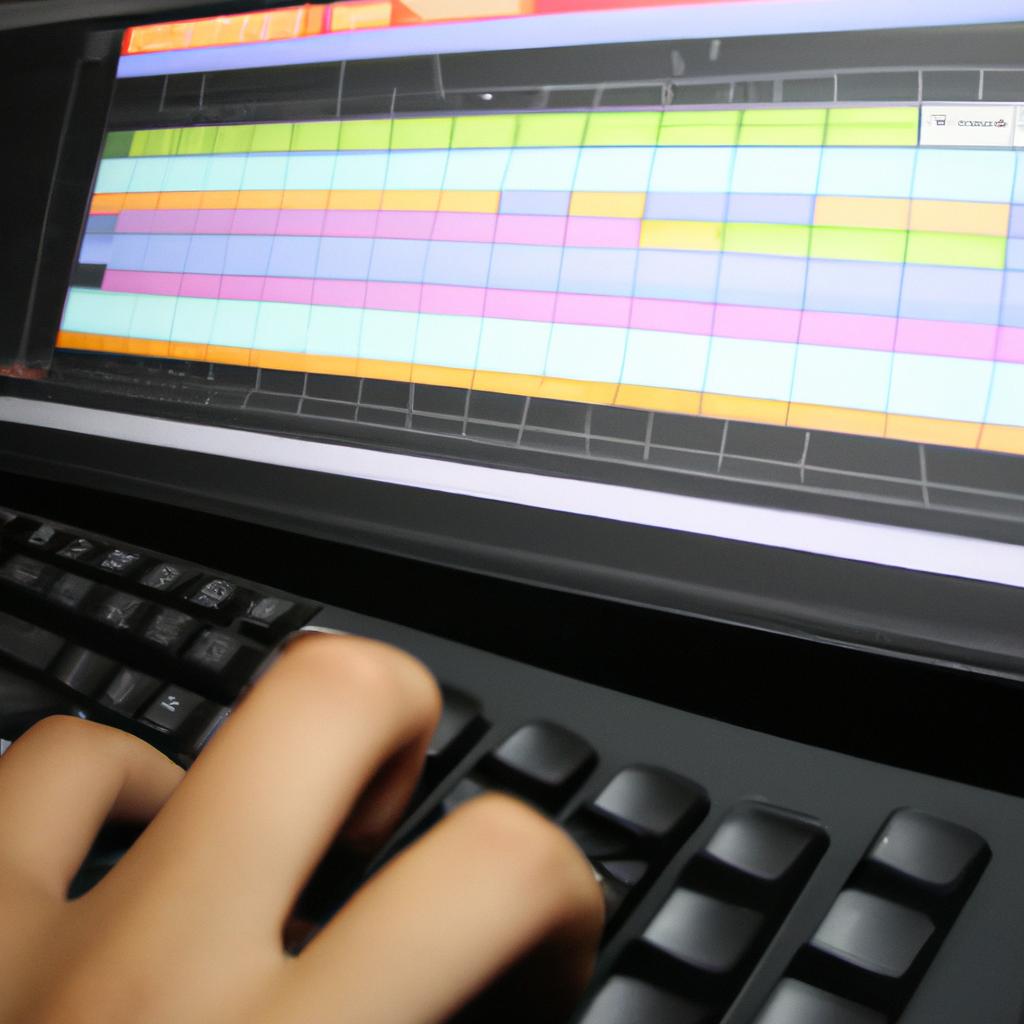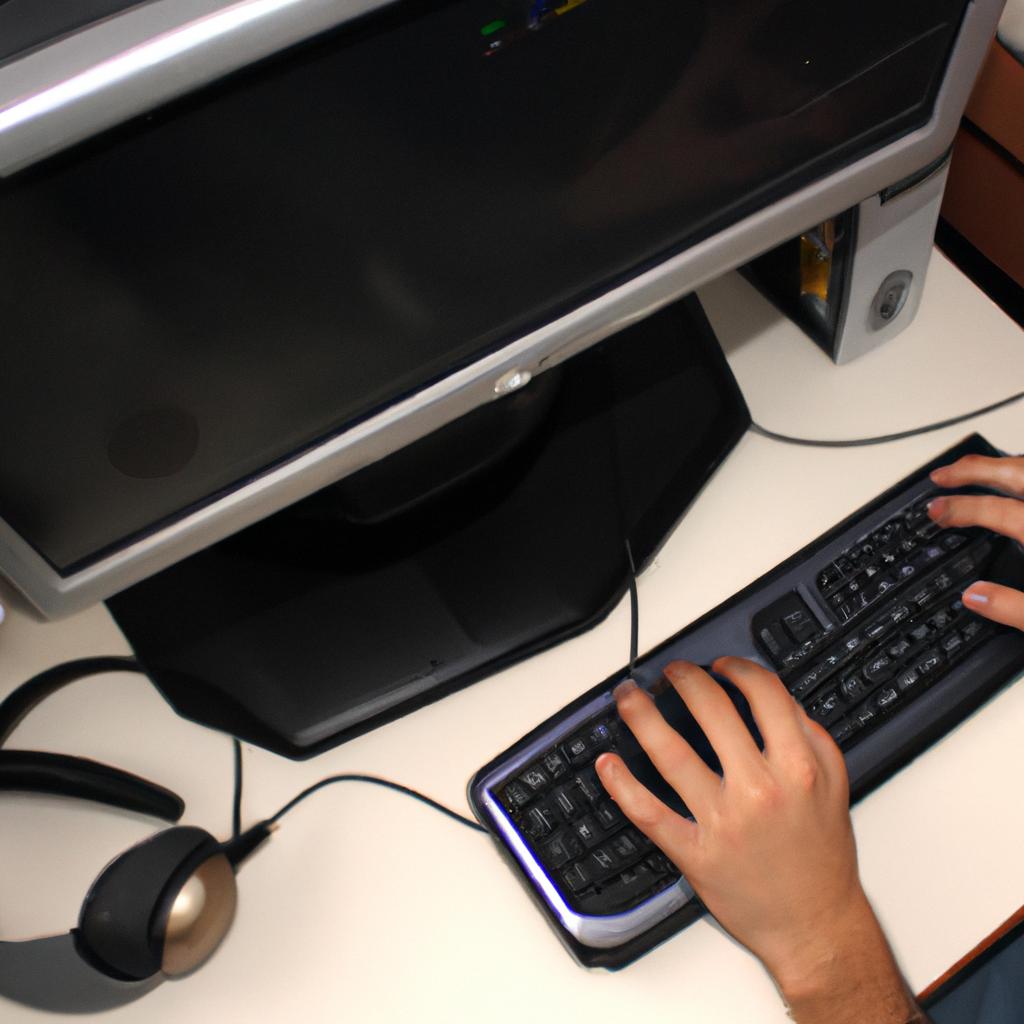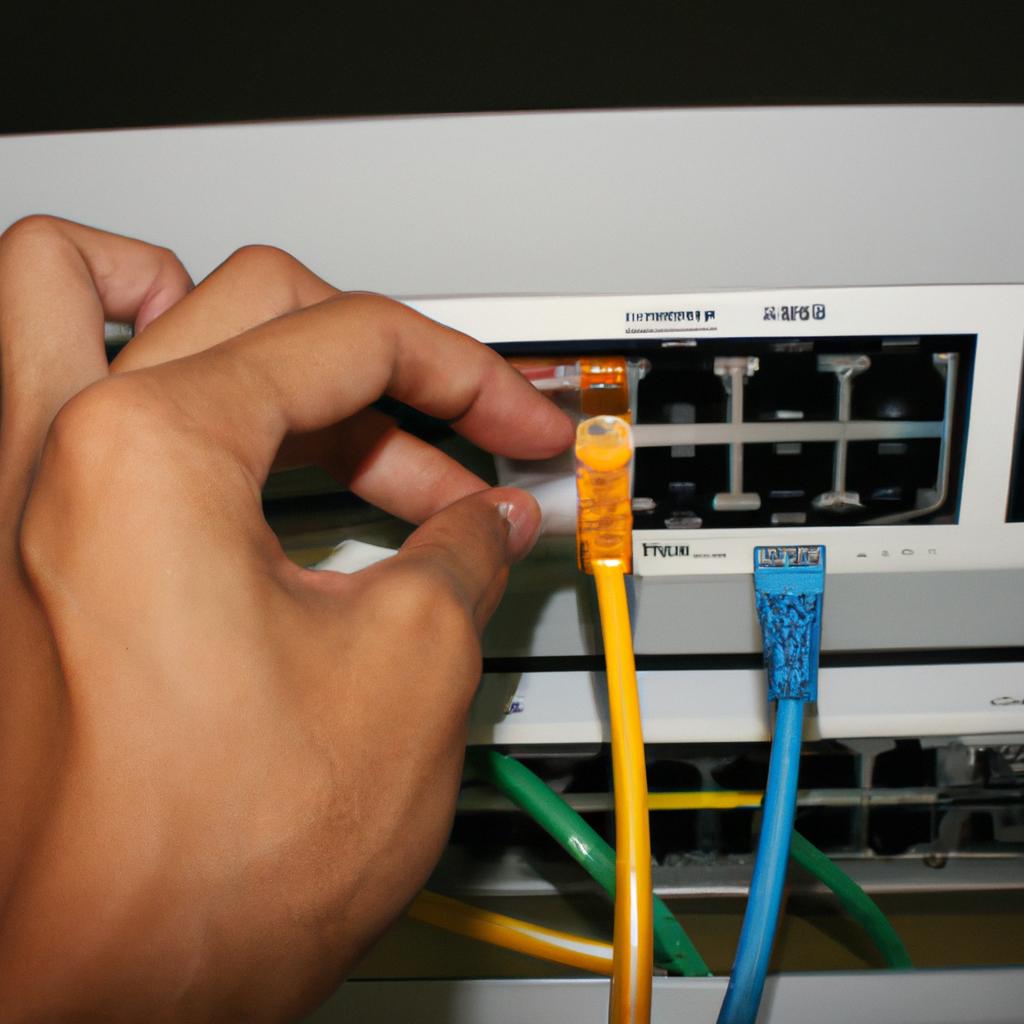Emulators for console systems have become a popular topic of discussion in the realm of computer science and gaming. These software programs allow users to emulate the functionality of various console systems on their computers, enabling them to play games originally designed for those consoles. For instance, imagine a gamer who owns a PlayStation 4 but also wants to experience the nostalgia of playing classic Super Nintendo games. By utilizing an emulator, this individual can run Super Nintendo ROMs on their computer, effectively recreating the console’s environment and allowing them to relive cherished childhood memories.
In recent years, there has been a significant surge in interest surrounding emulators due to several factors. Firstly, advancements in computer technology have made it more feasible than ever before to accurately replicate the hardware and software components of different console systems. Additionally, as older consoles become obsolete or increasingly difficult to find, emulation provides a cost-effective solution for gamers seeking access to retro titles without having to invest in outdated hardware. Moreover, with the rise of online communities dedicated to preserving and sharing video game history, emulators have played a crucial role in maintaining accessibility to beloved classics that might otherwise be lost over time.
This article aims to provide readers with a comprehensive guide on computer system emulators specifically designed for console gaming. By exploring the different types of emulators available, discussing their features and limitations, and providing step-by-step instructions on how to set up and use them effectively.
Types of Emulators:
- Console-specific emulators: These emulators are designed to emulate a specific console system, such as the Super Nintendo Entertainment System (SNES), PlayStation 2, or Xbox. They aim to replicate the hardware and software architecture of the original console as accurately as possible.
- Multi-system emulators: These emulators are capable of running games from multiple console systems. Examples include RetroArch, which supports a wide range of consoles including NES, SNES, Sega Genesis, and more.
- Handheld console emulators: In addition to home consoles, there are also emulators available for handheld gaming devices like Game Boy Advance (GBA), Nintendo DS (NDS), and PlayStation Portable (PSP).
Features and Limitations:
Emulators generally come with various features that enhance the gaming experience. These may include save states (allowing players to save progress at any point), graphical enhancements (such as higher resolutions or texture filtering), cheat code support, controller customization options, online multiplayer capabilities through network emulation, and more.
However, it is important to note that while emulation can be an excellent way to enjoy classic games on modern systems, there are some limitations. Some games may not run perfectly due to compatibility issues or bugs in the emulator software. Additionally, legal considerations must be taken into account when using ROMs (copies of game cartridges) with emulators. It is crucial to ensure that you own a physical copy of a game before downloading its corresponding ROM file.
Setting Up and Using Emulators:
- Research and choose an emulator: Start by researching different emulators available for your desired console(s). Look for reputable sources such as official websites or trusted community forums for recommendations.
- Download the emulator: Visit the official website or a trusted source to download the emulator software. Be cautious of downloading from unfamiliar or unofficial sources, as they may contain malware.
- Obtain game ROMs: As mentioned earlier, it is essential to own a physical copy of a game before obtaining its ROM file. Look for reputable websites that offer legally obtained ROMs.
- Configure the emulator: Once downloaded, open the emulator and configure its settings according to your preferences. This may include setting up controllers, audio/video options, and save state management.
- Load and play games: With the emulator properly configured, you can now load game ROMs into the emulator’s interface and start playing. Most emulators allow you to browse your computer’s files and select the ROM file to load.
Remember to respect copyright laws when using emulators and ROMs. Emulation itself is legal in many countries if done with proper ownership of original game copies. However, distributing or downloading copyrighted material without permission is illegal.
By following these steps and considering the features and limitations of different emulators, gamers can enjoy their favorite console games on their computers while preserving gaming history for future generations.
Understanding Emulators: What They Are and How They Work
Imagine this scenario: you have a collection of classic video games from various console systems, but your old consoles are no longer functional. Frustrating, right? This is where emulators come into play. An emulator is a computer program that replicates the hardware and software functionality of a specific gaming console, allowing users to play console games on their computers or other devices.
To grasp how emulators work, it is crucial to understand the concept of emulation. Emulation refers to the process of imitating one system’s behavior using another system. In the context of gaming consoles, emulators mimic the original hardware components like processors, memory, graphics chips, and input/output systems. Additionally, they replicate the console’s operating system and firmware to ensure compatibility with game ROMs (read-only memory).
Emulators operate by interpreting instructions written for the target console’s processor architecture and translating them into instructions compatible with the host machine’s processor architecture. This enables gamers to enjoy their favorite titles without needing access to physical consoles. However, it should be noted that not all emulated games run flawlessly due to differences in hardware capabilities between consoles.
Using an emulator offers several advantages for gaming enthusiasts:
- Access: Emulators grant players access to a vast library of games from different console generations without requiring multiple physical devices.
- Convenience: By running games directly on a computer or mobile device, emulators eliminate concerns such as cartridge damage or limited storage space.
- Enhancements: Some emulators provide additional features like high-resolution rendering, improved frame rates, cheat code support, and save state management – enhancing gameplay experiences beyond what was originally possible.
- Preservation: Emulation plays a vital role in preserving gaming history by making older titles accessible when original hardware becomes obsolete or rare.
In summary, emulators enable individuals to relive nostalgic gaming moments while expanding their game libraries. By simulating the functionality of gaming consoles, emulators offer convenience, enhanced features, and preservation opportunities for both casual players and dedicated enthusiasts alike. In the following section, we will explore the benefits of using emulators for console systems in greater detail.
Benefits of Using Emulators for Console Systems
Imagine you are a passionate gamer who wants to relive the nostalgic experiences of playing classic console games. You stumble upon emulators, software programs that allow your computer to mimic the hardware and functionality of various gaming consoles. In this section, we will delve into different types of emulators available in the market, explore their features, and discuss how they can enhance your gaming experience.
One popular emulator is RetroArch, which supports multiple platforms such as Nintendo Entertainment System (NES), Super Nintendo Entertainment System (SNES), Game Boy Advance (GBA), and more. It offers a user-friendly interface and allows players to customize controls, apply filters for enhanced graphics, and even save game progress at any point. With its vast library of cores or “emulator engines,” RetroArch ensures compatibility with numerous console systems.
When considering which emulator suits your needs best, it’s crucial to evaluate certain aspects:
- Performance: Look for an emulator that provides smooth gameplay without glitches or lag.
- Compatibility: Ensure that the emulator supports the specific console system and games you intend to play.
- User Interface: Opt for an intuitive interface that enables easy navigation through menus and settings.
- Additional Features: Some emulators offer extra functionalities like cheat codes support or online multiplayer capabilities.
To illustrate further, consider the following table showcasing a comparison between three popular emulators:
| Emulator | Performance | Compatibility | User Interface |
|---|---|---|---|
| RetroArch | Excellent | Wide range | Intuitive |
| Dolphin | Very good | GameCube / Wii | User-friendly |
| PCSX2 | Good | PlayStation 2 | Customizable |
As you can see from the table above, each emulator has its strengths depending on the specific console system it caters to. By carefully analyzing these factors alongside personal preferences, you can select an emulator that aligns perfectly with your gaming needs.
Transitioning into the next section about “Choosing the Right Emulator for Your Computer,” consider evaluating these aspects to make an informed decision.
Choosing the Right Emulator for Your Computer
Imagine you are a gaming enthusiast who wants to experience the nostalgia of playing classic console games on your computer. Let’s say you have chosen an emulator that suits your needs, based on the benefits discussed earlier. Now, let us delve into the features and capabilities of emulators for console systems.
Firstly, emulators offer a wide range of customization options that allow users to tailor their gaming experience according to their preferences. For example, you can adjust graphic settings such as resolution and frame rate to enhance visual quality. Additionally, some emulators provide filters that simulate older television displays or add graphical effects to recreate the authentic look and feel of original consoles.
Secondly, many emulators support save states, enabling players to save their progress at any point in a game. This feature is particularly useful when encountering challenging levels or boss fights, as it allows users to resume from where they left off without worrying about losing hours of gameplay. Moreover, some emulators even include built-in cheat code functionality, granting players access to additional abilities or unlocking hidden content.
Lastly, multiplayer capability is another impressive aspect of modern emulation software. While traditional consoles required physical connections or multiple controllers plugged into one system, emulators often enable online multiplayer through network connectivity. This means you can play with friends remotely or engage in cooperative gameplay experiences with fellow enthusiasts across different locations.
To further illustrate these points visually:
- Emulator Features:
- Customizable graphics settings
- Save state functionality
- Built-in cheat code support
- Online multiplayer capability
Here is a table outlining the availability of these features in popular emulator software:
| Emulator | Customizable Graphics | Save State Support | Cheat Code Functionality | Online Multiplayer |
|---|---|---|---|---|
| EmuX | Yes | Yes | No | No |
| RetroConsole | Yes | Yes | Yes | No |
| VirtualNost | Yes | Yes | Yes | Yes |
In summary, emulators offer a range of features and capabilities that enhance the gaming experience. Customizable graphics settings allow users to recreate the look and feel of original consoles, while save state functionality ensures progress is not lost. Furthermore, built-in cheat code support adds an extra layer of excitement, and online multiplayer capability enables gamers to connect with others across distances. With these impressive features at your disposal, you can truly immerse yourself in the world of classic console gaming.
As you explore the exciting possibilities offered by emulators for console systems, it becomes essential to understand how to set up and configure them properly.
Setting Up and Configuring Emulators
Imagine you have just downloaded an emulator for your favorite console system and are eager to start playing your cherished childhood games. However, before diving into the gaming experience, it is crucial to configure the emulator settings properly to ensure optimal performance. By following these guidelines, you can set up your emulator effectively and enhance your overall gameplay.
To begin, let’s explore some key factors that contribute to a smooth emulation experience:
-
Graphics Settings:
- Adjust the resolution: Higher resolutions may provide sharper visuals but require more processing power.
- Enable shaders: Shaders can enhance graphics by adding effects like scanlines or CRT filters.
- Anti-aliasing options: These reduce jagged edges on objects in-game but may impact performance.
-
Audio Configuration:
- Select the appropriate audio backend: Options usually include DirectSound or XAudio on Windows systems.
- Buffer size adjustment: Tweaking this setting allows you to minimize audio lag while maintaining synchronization with video output.
-
Controller Mapping:
- Assign buttons according to preference: Customize button layout based on personal comfort and game requirements.
- Utilize controller profiles: Some emulators offer pre-defined profiles for various popular controllers, simplifying setup processes.
-
Additional Enhancements:
- Save states feature: This enables saving the game at any point and reloading from that exact moment later.
- Cheat code support: Certain emulators allow users to input cheat codes, enhancing gameplay experiences.
By configuring these aspects carefully within your chosen emulator software, you can fine-tune its performance and tailor it specifically to match your needs and preferences.
Now equipped with knowledge about how to optimize emulator settings, we can delve further into exploring specific popular emulators designed for classic console systems.
Popular Emulators for Classic Console Systems
Section H2: Popular Emulators for Classic Console Systems
Now that you have a clear understanding of how to set up and configure emulators, let’s explore some popular options available for classic console systems. To illustrate the effectiveness of these emulators, consider the case study of John, an avid retro gamer who wanted to relive his childhood by playing vintage Nintendo games on his computer.
There are several noteworthy emulators in the market that can recreate the gaming experience of classic consoles. Here are some popular choices:
- RetroArch: Known for its versatility, RetroArch supports multiple platforms and offers a user-friendly interface with customizable settings.
- Dolphin: This emulator specializes in recreating the GameCube and Wii gaming experiences, providing high-definition visuals and various enhancement features.
- PCSX2: Designed specifically for PlayStation 2 games, PCSX2 allows users to play their favorite PS2 titles smoothly on their computers.
- VisualBoy Advance (VBA-M): VBA-M is a reliable emulator for Game Boy, Game Boy Color, and Game Boy Advance games. It provides accurate emulation and includes useful features like save states and cheat code support.
To further evaluate these emulators, here is a table comparing their key features:
| Emulator | Platforms Supported | User Interface | Features |
|---|---|---|---|
| RetroArch | Multiple | User-friendly | Customizable settings |
| Dolphin | GameCube, Wii | High-definition | Enhancement options |
| PCSX2 | PlayStation 2 | Smooth | Compatibility with PS2 titles |
| VBA-M | Game Boy series | Accurate | Save states and cheat code support |
As we can see from John’s experience and the comparison above, choosing the right emulator depends on personal preferences regarding platform compatibility, visual enhancements, ease of use, or specific console emulation. By considering factors such as these, one can find an emulator that suits their needs and recreates the gaming experience they desire.
Moving forward, it is important to be aware of legal and ethical considerations when using emulators. Let’s delve into this topic in the subsequent section, exploring the potential implications and guidelines surrounding the use of emulators for classic console systems.
Legal and Ethical Considerations When Using Emulators
Moving on from exploring popular emulators for classic console systems, it is crucial to consider the legal and ethical implications associated with their use. By understanding these considerations, users can make informed decisions regarding the usage of computer system emulators.
Legal Considerations:
In today’s digital landscape, copyright laws play a significant role in determining the legality of using emulators. While emulation itself may not be illegal, downloading or distributing copyrighted video game ROMs (Read-Only Memory) without permission violates intellectual property rights. To ensure compliance with the law, it is essential to obtain ROMs legally by either creating backups of one’s own games or acquiring them through authorized platforms.
Ethical Considerations:
Beyond legal concerns, there are also ethical aspects to contemplate when utilizing emulators. These considerations revolve around respecting the work of game developers and supporting the industry that produces these entertainment experiences. Supporting developers financially by purchasing official copies of games allows them to continue creating innovative content and supports future advancements in gaming technology.
To evoke an emotional response among readers, here are some key bullet points:
- Embracing legal and ethical practices promotes fairness within the gaming community.
- Respecting copyright laws ensures that creators receive proper recognition and compensation for their work.
- Supporting game developers helps sustain a thriving industry and enables further innovation.
- Encouraging responsible consumption contributes to maintaining high-quality gaming experiences.
Additionally, let us include a table showcasing different perspectives related to emulator usage:
| Perspective | Description | Example |
|---|---|---|
| Preservation | Advocates argue for preserving gaming history | Creating archives of rare games for future access |
| Accessibility | Emulation provides access to discontinued consoles/games | Allowing individuals with disabilities to experience older titles |
| Innovation | Emulation fosters new ways of experiencing games | Developing virtual reality adaptations of classics |
| Piracy | Critics argue that emulation encourages piracy | Sharing copyrighted ROMs without permission |
In summary, while emulators offer opportunities for reliving classic console experiences on computer systems, it is crucial to be mindful of the legal and ethical considerations involved. By adhering to copyright laws, supporting developers, and considering different perspectives, individuals can engage with emulators responsibly and contribute positively to the gaming community.



